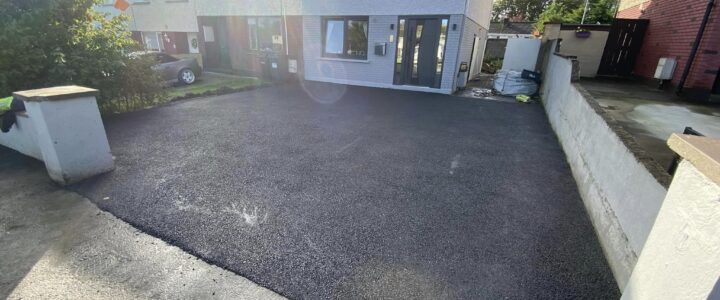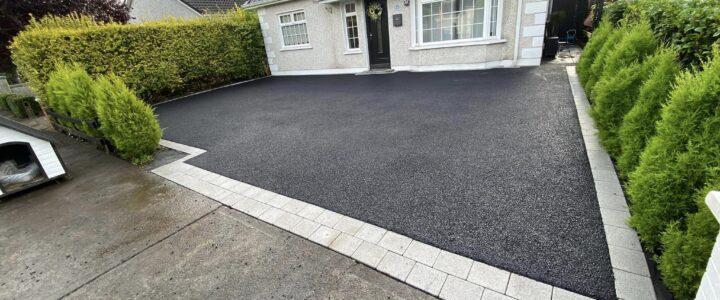Tar and chip job completed in Ballsbridge Dublin with the ballylusk chip.
Get in touch for a free quote!
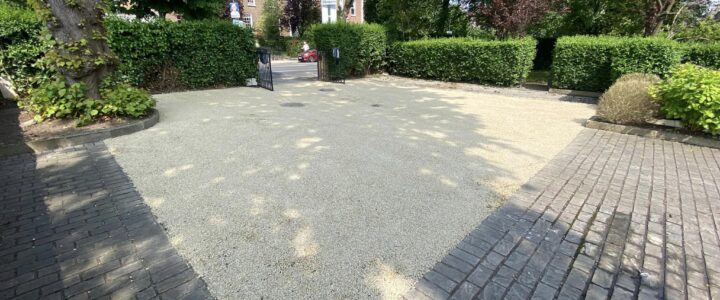
Tar and chip job completed in Ballsbridge Dublin with the ballylusk chip.
Get in touch for a free quote!
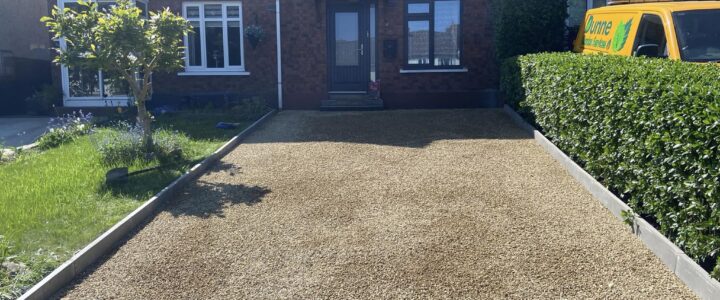
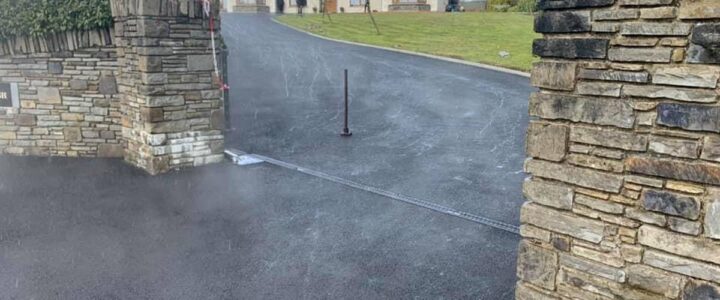
Choosing the right paving material for your Dublin property is an important decision. After all, a well-paved driveway, patio, or path not only enhances the functionality and visual appeal of your outdoor space but also adds value to your home.
In Dublin, where the climate, local regulations, and urban landscape play significant roles, property owners and real estate developers often end up comparing two primary paving options: asphalt vs. concrete. Both offer distinct advantages and disadvantages, and understanding these differences is crucial for making an informed selection. This comprehensive guide will delve into the world of asphalt and concrete paving in Dublin, equipping you with the knowledge to choose the perfect option for your needs.
Asphalt paving is a mixture of aggregate stone, sand, and asphalt binder, which is a petroleum product. This combination is heated and laid down on the designated area and then compacted to create a smooth, solid surface.
Asphalt offers several attractive benefits for Dublin property owners. Perhaps the most significant advantage is its cost-effectiveness. Compared to concrete, asphalt is generally cheaper to install, making it a budget-friendly paving option.
Additionally, its quick setting time and durability make it a preferred choice for many, especially for high-traffic areas like driveways and roadways. Since asphalt installation is typically quicker, minimal disruption to property and daily routine can be expected.
Asphalt also boasts a smooth, seamless finish that provides excellent driving and walking experiences. Its flexibility also contributes to some degree of crack resistance, especially when compared to concrete.
Another advantage of asphalt paving is its relative ease of repair. Patching minor cracks or potholes in asphalt is a simpler and less labour-intensive process compared to concrete repairs. Furthermore, asphalt installation is typically quicker than concrete, minimising disruption to your property and daily routine.
One key drawback is the need for more frequent maintenance. Unlike concrete, asphalt requires periodic resealing, usually every 4-7 years, to maintain its flexibility and prevent cracks. This resealing process incurs additional costs throughout the lifespan of the pavement.
Another disadvantage of asphalt is its shorter lifespan compared to concrete. While properly installed and maintained asphalt pavements can last 15-20 years, concrete can often surpass 30 years.
Additionally, asphalt can soften during periods of extreme heat, potentially leading to surface deformation. Finally, some may find the classic black colour of asphalt less visually appealing than some of the design options available with concrete.
Concrete is a widely used construction material composed of cement, sand, gravel, and water. When mixed, these elements form a rigid and durable material ideal for a variety of applications, including paving driveways.
The primary advantage of concrete paving is its exceptional durability. Concrete pavements are known to last significantly long, often exceeding 30 years with proper care. Its durability makes it a robust option for a variety of applications beyond driveways, including patios, paths, and even interior floors. While it may come with a higher upfront cost, its minimal maintenance needs make it a cost-effective solution over its lifespan.
Another major benefit of concrete is its design versatility. Unlike the classic black asphalt, concrete offers a wider range of aesthetic possibilities. Coloured concrete can be used to create visually striking driveways and patios that complement the style of your property. Additionally, stamped concrete allows for the creation of unique patterns and textures that mimic the look of natural stone or cobblestones. This design flexibility allows you to personalise your outdoor space and enhance its curb appeal.
In terms of maintenance requirements, concrete generally only needs occasional cleaning and minor crack repairs. Its minimal maintenance needs make it a cost-effective solution over its lifespan
Concrete, while popular for its strength and durability, does have its set of disadvantages when compared to other driveway materials. One significant drawback is its susceptibility to cracking, which occurs not only from improper installation but also from external factors such as excessive weight, movement in the ground, or even natural weather conditions like freeze-thaw cycles. These cracks can be challenging and costly to repair, often requiring extensive work to ensure the structural integrity and aesthetic appeal of the concrete surface are restored.
Another area where concrete might not be the ideal choice relates to its installation process. Unlike asphalt and tarmac, which can be laid and ready for use in a considerably shorter timeframe, concrete paving demands a longer and more disruptive installation process. This includes a curing period that can extend up to a week or more during which the surface cannot be used. This extended downtime may not be convenient for everyone, posing a significant inconvenience compared to other quicker-to-install materials.
Moreover, safety concerns with concrete surfaces are not to be overlooked. They can become extremely slippery in wet conditions, posing a hazard to vehicles and pedestrians alike. Although this risk can be mitigated by applying a textured finish or incorporating non-slip additives into the concrete mix, these solutions add to the overall cost and maintenance of a concrete driveway. Such additional measures, while effective in reducing the risk of slips and falls, underscore the need for careful consideration when choosing concrete for areas frequently exposed to water or ice.
As shown above, both driveway materials come with their own sets of advantages and drawbacks, impacting cost, maintenance, durability, and aesthetic appeal. In this section, we’ll provide more details to help you make an informed decision.
Each material’s installation time and costs are significant factors that weigh heavily on your decision based on immediate budget constraints and long-term financial planning.
The initial cost of asphalt paving is generally lower than that of concrete, due to the lower material and labour costs. Asphalt can also be installed relatively quickly, often within a day for a standard-sized driveway, and is ready for use much sooner than concrete, which can take up to a week to cure.
Although concrete is more expensive to install than other materials, it offers a better return on investment over time. The infrequent need for repairs and its longevity (30 years or more with proper maintenance) may offset the initial investment over time.
When it comes to durability, both materials offer considerable strengths. Asphalt is flexible, which makes it less susceptible to cracking under pressure or due to ground movements. However, its lifespan is shorter, typically between 15 to 20 years, requiring more frequent resurfacing or replacement.
Concrete shines in longevity and resistance to wear and tear, easily lasting 30 years or more when properly maintained. It stands up well to heavy use but can be prone to cracking with extreme temperature fluctuations. For Dublin’s climate, where freeze-thaw cycles are common, this can be a consideration worth noting.
Maintenance is where asphalt and concrete significantly differ. Asphalt driveways need to be seal-coated every two to five years to protect against water penetration and to maintain its appearance. This maintenance can add to the total cost of ownership over its lifespan.
Meanwhile, concrete requires less frequent upkeep. It does not need sealing as often as asphalt, especially in mild climates. But any stains or fluids must be cleaned promptly to avoid permanent discolouration. Furthermore, cracks, when they occur, can be more challenging and costlier to repair than those in an asphalt surface.
Sustainability is increasingly becoming a critical factor in choosing building materials. Asphalt paving, though not usually praised for its environmental benefits, can be recycled effectively, potentially reducing the need for new raw materials and lowering greenhouse gas emissions associated with its production.
Concrete is noted for its reflectivity, which reduces the need for lighting at night and can lower temperatures in urban areas. However, the cement production process is energy-intensive and contributes significantly to carbon dioxide emissions. Newer, more environmentally friendly cement mixtures are being developed, which may help mitigate these concerns.
Aesthetics play a pivotal role in the selection process for many property owners. Asphalt offers a classic, uniform look that blends well with most property styles. Its options for customisation are limited, though creative bordering and the introduction of aggregate for texture can enhance its appearance.
Concrete’s versatility in aesthetics is unmatched. It can be stamped, coloured, and finished in numerous ways to mimic other materials such as brick, natural stone, or even wood. This flexibility allows property owners to tailor the paving to complement their property’s architectural style and landscape design, making concrete a popular choice for those prioritizing curb appeal.
The initial cost of your project is likely a major deciding factor when choosing between asphalt and concrete for your Dublin property. Here’s a breakdown of the cost considerations for both materials, using figures specific to the Dublin market:
In Dublin, expect to pay around €50 to €80 per square metre for asphalt and €75 to €110 per square metre for concrete. This price difference can be significant, especially for larger paved areas like driveways or parking lots.
Asphalt installation in Dublin is typically faster and less labour-intensive compared to concrete. This translates to lower labour costs. Asphalt installation costs generally range from €20 to €35 per square metre, whereas concrete installation can cost €30 to €45 per square metre.
Asphalt requires more frequent maintenance than concrete. Regular resealing, typically every 4-7 years, is necessary to maintain its flexibility and prevent cracks. In Dublin, expect to pay €15 to €25 per square metre for asphalt resealing. These resealing costs add up over the lifespan of the pavement.
If you are considering using these materials for your driveway, here’s what you can expect to spend:
The cost of installing an asphalt driveway typically ranges from about €50 to €100 per square meter in urban areas like Dublin. This price includes both material and labour costs. The lower end of this range may apply to more straightforward projects with minimal preparation work required. Meanwhile, the higher end of the range aplly to larger, complex projects involving features like custom edging, extensive excavation, or thicker asphalt layers for heavy traffic loads.
In contrast, concrete driveways usually cost between €80 to €120 per square meter. This price range recognizes concrete’s higher material cost and the additional labour required for its installation. The variances in price can also reflect the choice of finish or the addition of decorative elements, which can elevate the aesthetic appeal and the cost.
It’s crucial to note that these figures are indicative and can vary based on several factors, including the scale of the project, geographical location within Dublin, and the choice of contractor. Additionally, while asphalt might be more affordable initially, concrete driveways typically offer a longer lifespan and may require less maintenance over time, potentially leading to cost savings in the long run.
Choosing between asphalt and concrete for your Dublin driveway can be a tough call. As such, we’ve created the table below to provide a quick reference to key factors that can help you make an informed decision:
| Factor | Asphalt | Concrete |
| Budget | More cost-effective upfront | Higher initial cost but fewer maintenance costs |
| Intended Use | Suitable for driveways and high-traffic areas | Ideal for patios, paths, and where aesthetics are key |
| Aesthetics | Limited customisation | High customisation and versatility |
| Maintenance | Requires regular maintenance | Less maintenance but harder to repair |
| Climate Resilience | Suitable for colder climates; quick to show wear | Susceptible to cracking in freeze-thaw conditions |
Still can’t decide which paving material to use? Here are some insights from experienced Dublin pavers to help you make the best choice:
Asphalt’s lower upfront cost can be very attractive, especially for budget-conscious homeowners. However, remember to factor in the recurring costs of resealing every 4-7 years, which can add up over the lifespan of the pavement (resealing typically costs €15-€25 per square metre in Dublin).
If you prioritise a long-term solution and a lower overall cost over time, concrete might be the better choice. While the initial installation is more expensive, concrete’s extended lifespan (often exceeding 30 years) and lower maintenance requirements can translate to significant savings compared to asphalt’s shorter lifespan (typically 15-20 years) and need for resealing.
The cost difference between asphalt and concrete becomes more significant for larger projects like driveways or parking lots. For smaller pathways or patios, the price gap might be less noticeable. In these cases, you can prioritize your preferred material based on aesthetics or other factors.
Consult with reputable Dublin paving contractors. They can assess your specific needs, property, and budget to recommend the most suitable option for your driveway or pavement project.
Do you prioritise a clean black look or prefer the design flexibility offered by coloured or patterned concrete?
Asphalt requires more frequent maintenance, while concrete repairs can be more extensive. Consider your tolerance for upkeep when making your decision.
In conclusion, the choice between asphalt and concrete for your Dublin property entails a careful consideration of your immediate and long-term needs. Budget, intended use, desired aesthetics, maintenance, and local climate are critical factors to weigh.
Asphalt may suit those looking for a cost-effective, quick solution, particularly for driveways that need to withstand heavy use. Concrete, with its durability, low maintenance, and aesthetic versatility, can be the ideal choice for those planning for the long term, offering a premium finish that enhances property value.
Exploring your paving options with a professional can provide tailored advice and insights specific to your property’s requirements. Whether asphalt or concrete, the right choice will enhance your Dublin property’s functionality, appeal, and overall value for years to come.
Ready to transform your Dublin driveway or patio with a stunning and durable surface? Don’t get stuck in the asphalt vs. concrete dilemma! Let our experienced paving contractors guide you through the pros and cons of each, ensuring you make an informed decision tailored to your property’s needs and aesthetics. Call us now at (01) 4851582 or 0852139591 to schedule a consultation!
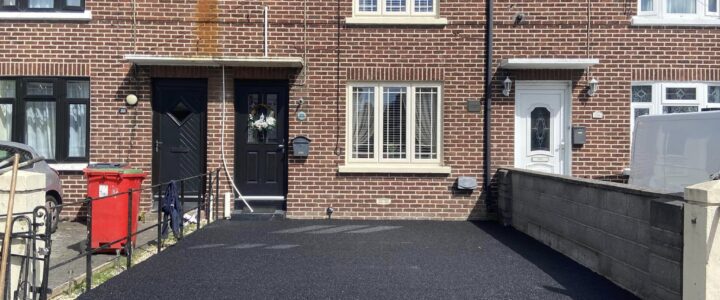
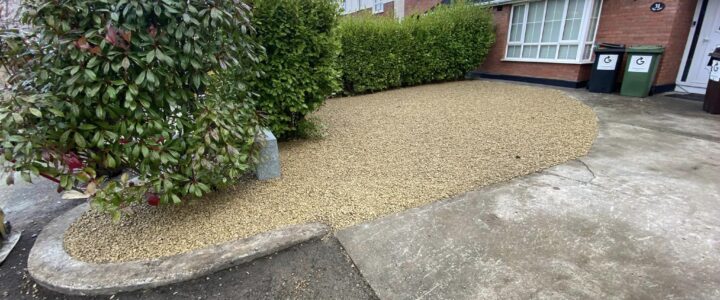
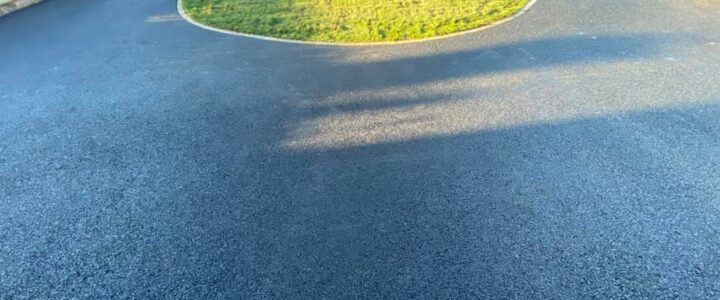
Are you a proud homeowner in Dublin with a tarmac driveway? If so, you’re already aware of the importance of this prominent feature in creating a positive first impression. Your driveway not only serves as a practical entry point but also significantly contributes to your property’s overall curb appeal. However, have you ever considered giving your driveway a touch of luxury to elevate your property’s aesthetic appeal and functionality? In this blog, we’ll guide you through the process of enhancing your tarmac driveway in Dublin, ensuring that it not only looks stunning but also stands the test of time. So, let’s embark on this journey to transform your driveway into a luxurious asset.
Before diving into the world of luxury upgrades, it’s essential to understand the basics of tarmac driveways. Tarmac is a durable and cost-effective material that offers numerous advantages for Dublin homeowners. Its weather resistance, longevity, and ability to withstand heavy traffic make it a popular choice in Dublin.
When you choose tarmac for your driveway, you’re not only investing in a reliable and sturdy surface but also contributing to the timeless elegance of your property. Its smooth, sleek appearance can complement various architectural styles, adding to the aesthetic appeal of your home. Moreover, tarmac’s durability ensures that your driveway will look stunning for years to come with minimal maintenance.
To begin the transformation, you should assess the current state of your tarmac driveway. Are there cracks or potholes that require immediate attention? Addressing these issues is the first step in preparing your driveway for a luxurious makeover. Not only does this ensure the structural integrity of your driveway, but it also sets the stage for a smooth and beautiful finish.
Additionally, consider the budget required to cover necessary repairs and maintenance. It’s essential to allocate resources appropriately to guarantee the success of your project. Investing in high-quality repairs will provide a solid foundation for the luxury enhancements that will follow, ensuring that your driveway remains stunning and functional.
The design and planning stage is where you can let your creativity shine. Consider the tarmac colour and finish that complements your home’s exterior. Whether you prefer a classic black finish or a more unique colour that matches your property’s palette, tarmac allows for a wide range of customisation. Furthermore, explore options for incorporating patterns and borders to add a touch of elegance. Adding decorative borders and patterns can create a visually striking effect that sets your driveway apart. It’s all about personalising your driveway to reflect your individual style and make a statement about your home.
For environmentally conscious homeowners, permeable tarmac is a sustainable choice that allows water to drain through, reducing the risk of flooding. In Dublin, where environmental considerations are increasingly important, choosing permeable tarmac aligns with the city’s commitment to sustainability. This eco-friendly option not only enhances the appeal of your driveway but also contributes to the responsible use of resources. With the potential to reduce runoff and support groundwater recharge, permeable tarmac is a smart and stylish choice for those looking to make a positive environmental impact.
Selecting a reputable contractor is crucial to achieving the luxurious driveway you desire. Do your homework, research local contractors in Dublin, ask for referrals from friends and neighbours, and read reviews to ensure you hire a professional who can bring your vision to life. A skilled and experienced contractor is your key to a successful project, ensuring that every aspect of your driveway upgrade is executed to perfection. Additionally, always request quotes and compare services to make an informed decision. Remember that your driveway is a significant investment, and the quality of workmanship is paramount. By taking the time to select the right contractor, you’re not just ensuring a beautiful driveway but also peace of mind throughout the project.
Once you’ve found the right contractor, the installation process begins. This involves site preparation, base laying, tarmac application, and achieving a smooth, flawless finish. The quality of the installation process is critical to the durability and overall appearance of your driveway. Site preparation involves assessing the existing conditions and making any necessary adjustments. This may include excavation and grading to ensure proper drainage and a level surface. The base layer is crucial in providing stability and support for the tarmac. A strong base ensures that your driveway can withstand the weight of vehicles and the challenges of the ever-changing Dublin weather.
The tarmac application is where the transformation truly takes shape. Experienced professionals will apply the tarmac smoothly, ensuring an even and attractive surface. Achieving a flawless finish is essential, as it not only enhances the appearance but also contributes to the longevity of your driveway. Proper curing and sealing are essential to ensure the longevity of your luxurious tarmac driveway. These steps protect the surface from damage caused by the elements and vehicle traffic. A well-sealed tarmac driveway will resist the effects of weather and remain looking pristine for many years to come.
To keep your driveway looking its best, regular cleaning and maintenance are essential. Learn how to deal with cracks and potholes promptly to prevent further damage. Cracks, if left unattended, can lead to more extensive issues that are costlier to repair. Potholes can also pose safety hazards, making prompt repairs a necessity. Additionally, consider resealing your tarmac driveway at regular intervals to protect it from the elements. Resealing not only extends the lifespan of your driveway but also keeps it looking fresh and well-maintained. It’s an investment in the long-term beauty and durability of your driveway.
A touch of luxury is all about personalisation. Enhance your driveway with decorative features like lighting and planters. These small but impactful additions can elevate the appearance of your driveway, creating a welcoming atmosphere and making it stand out. Lighting not only adds to the visual appeal but also improves safety by illuminating the path to your home.
Planters, strategically placed along the edges of your driveway, introduce greenery and a touch of nature to the space. Consider custom elements that showcase your unique style and personality, making your driveway truly your own. Whether it’s a monogrammed entrance or bespoke gate design, these details can transform your driveway into a reflection of your individuality.
Discover the benefits of a luxurious tarmac driveway, from boosting curb appeal and creating a lasting first impression to improving functionality and safety. Your driveway is often the first thing visitors and passersby notice, and a well-designed tarmac driveway can make a remarkable first impression. Not only does it add a touch of luxury to your home, but it also increases the overall value of your property. A luxurious driveway enhances the aesthetic appeal of your home, making it more inviting and desirable. It’s an investment that pays off, not only in terms of property value but also in the pleasure it brings to your daily life.
Moreover, a well-maintained tarmac driveway is a practical asset. Its durability and resistance to weather and heavy traffic make it a reliable surface for your vehicles. Safety is another crucial factor, as a well-constructed driveway minimises tripping hazards and ensures smooth, obstacle-free access to your home. In Dublin, where rain is a common occurrence, choosing permeable tarmac offers the added benefit of reducing the risk of flooding. This environmentally responsible choice allows water to drain through, reducing the strain on local drainage systems and contributing to the city’s sustainability efforts. By selecting a luxurious tarmac driveway, you’re not only enhancing your home’s appearance but also making a positive impact on your community and the environment.
In conclusion, your tarmac driveway is more than just a functional space; it’s an opportunity to add a touch of luxury to your property. By following the steps outlined in this blog, you can elevate your home’s exterior and make a lasting impression on visitors and passersby. Your driveway is an essential element of your property, and enhancing it can transform your house into a stunning home. So, why wait? Start your journey to a more luxurious driveway in Dublin today and experience the lasting benefits of a beautifully upgraded tarmac driveway.
Are you planning to upgrade your tarmac driveway in Dublin? Do you need expert advice for your tarmac driveway? Our team of experienced professionals are available to address your queries and concerns. Call us at (01) 4851582 | 0852139591 or click here to reach us today!
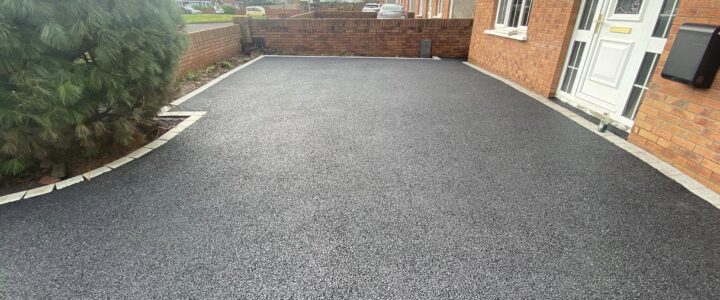
A well-constructed tarmac driveway not only enhances the aesthetic appeal of your property but also adds to its functionality and value. Whether you’re considering a new one or renovating your existing tarmac driveway in Dublin, financing the project is a crucial aspect to consider. In this article, we will explore various tips and financing options to help you undertake your tarmac driveway project with ease and confidence.
A tarmac driveway is a popular choice for homeowners in Dublin for several reasons. It offers a smooth and durable surface that can withstand the rigours of Dublin’s ever-changing weather conditions. Here are some key benefits of having a tarmac driveway:
Financing your tarmac driveway project in Dublin may seem daunting, but with careful planning and consideration, you can find an option that suits your budget and needs. Here are some tips to help you get started:
Financing a tarmac driveway project in Dublin requires careful planning and consideration of various options. By assessing your budget, obtaining multiple quotes, and exploring financing options such as personal savings, home equity loans, personal loans, and credit cards, you can make an informed decision that suits your financial situation.
Remember that the durability and aesthetic appeal of your tarmac driveway will add value to your property and enhance its curb appeal. Prioritise quality, even if it means stretching your budget a bit, as the long-term benefits will outweigh the initial costs.
Ultimately, the key to a successful tarmac driveway project in Dublin lies in finding the right balance between your budget and your vision for your property. With the right financing plan in place, you can transform your driveway into a functional and beautiful addition to your home.
Do you need to have a tarmac driveway for your home in Dublin? Do you have questions regarding financing options for your tarmac driveway? Our team is available to address your queries and concerns. Call us at (01) 4851582 | 0852139591 or click here to contact us!
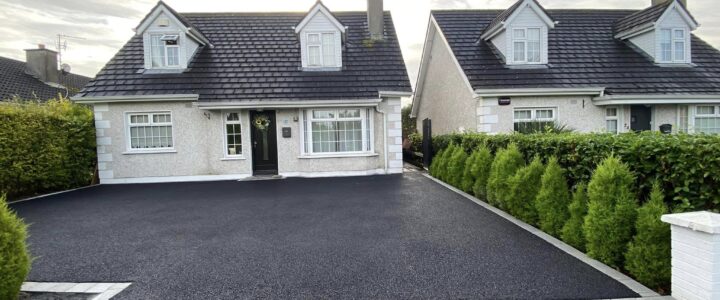
Your driveway is often the first impression visitors have of your home. It not only serves a functional purpose but can also significantly impact the overall aesthetics of your property.
In Dublin, where tarmacadam driveways are a popular choice due to their durability and cost-effectiveness, finding innovative ways to personalise your driveway can enhance your home’s curb appeal and express your unique style. In this article, we’ll explore some creative ideas to personalise your tarmacadam driveway in Dublin.
One common question that arises when considering a customised tarmacadam driveway in Dublin is whether it will come at a higher cost compared to a standard tarmacadam installation. Let’s delve into this aspect to provide clarity on the financial considerations:
The cost of your tarmacadam driveway can vary significantly based on the extent of customisation you desire. If you opt for unique colours, intricate patterns, or elaborate inlays, it’s reasonable to expect a higher upfront investment. However, the added visual impact and personalisation can be well worth it.
Personalised tarmacadam driveways often involve selecting specific materials, such as coloured tarmacadam mixes or decorative aggregates. These materials may have a higher price compared to traditional black tarmacadam. It’s essential to discuss material options with your installer to understand how they will impact the overall cost.
Achieving custom designs and patterns requires a higher level of skill and expertise from the installation team. This may result in slightly higher labour costs. However, the experience and precision of professionals can ensure that your custom driveway looks fantastic and lasts for years.
In summary, while a customised tarmacadam driveway in Dublin may come with a slightly higher initial cost compared to a standard installation, it offers unique benefits, including enhanced aesthetics, personalisation, and potential long-term savings. The decision to invest in customisation ultimately depends on your budget, priorities, and the value you place on creating a driveway that reflects your individual style and elevates your property’s curb appeal.
One of the most effective ways to personalise your tarmac driveway is by opting for coloured tarmacadam. Instead of the traditional black, you can choose from a variety of colours to complement your home’s exterior.
Earthy tones like brown or grey can provide a more natural look, while bolder colours like red or blue can make a striking statement. Coloured tarmacadam not only adds visual interest but also helps your driveway stand out from the typical blacktop surfaces in the neighbourhood.
Stamped patterns are an excellent way to give your tarmacadam driveway a unique and textured appearance. This technique involves imprinting patterns or designs onto the tarmacadam before it sets, creating a decorative effect.
You can choose from various stamp designs, such as brick, cobblestone, or even custom patterns to match your home’s architectural style. Stamped patterns not only enhance the visual appeal of your driveway but also add a touch of elegance and sophistication.
An exposed aggregate finish is achieved by revealing the natural stone or decorative aggregates in the tarmac driveway’s surface. This technique creates a visually appealing texture and adds a layer of depth to your driveway.
You can customise the exposed aggregate finish by selecting the type and colour of aggregates, allowing you to achieve a look that complements your home’s aesthetics and exterior paint. This option not only enhances the appearance of your driveway but also improves its slip resistance and durability.
A popular choice amongst Dublin property owners, adding decorative borders to your tarmacadam driveway is a simple yet effective way to personalise it. You can choose from a wide range of materials for the border, including bricks, pavers, or natural stone.
These borders can be installed along the edges of the driveway, creating a defined and attractive frame. Additionally, decorative borders can be customised in terms of colour and pattern, allowing you to match them with your home’s exterior or landscape design.
Inlays are a creative way to infuse personality into your tarmacadam driveway. You can incorporate various elements into the tarmacadam surface, such as mosaics, custom designs, or even your family’s initials. Inlays not only serve as a focal point but also allow you to express your individuality and make your driveway one-of-a-kind.
Consider using contrasting colours and materials for the inlays to make them stand out and create a visually striking effect.
Enhance the functionality and ambience of your tarmacadam driveway by incorporating solar lighting. Solar-powered lights can be embedded along the edges or within the driveway itself to illuminate the path at night. Not only do they improve safety by providing visibility, but they also add a warm and welcoming atmosphere to your home’s exterior.
Solar lights come in various styles and shapes, allowing you to choose ones that match your desired aesthetic.
Integrating greenery and landscaping into your tarmacadam driveway can create a harmonious blend of nature and design. Consider planting flower beds or trees along the sides of your driveway to soften its appearance and add a touch of greenery.
You can also incorporate decorative rocks, gravel, or mulch to define the landscaping elements. This approach not only personalised your driveway but also contributes to a more eco-friendly and inviting outdoor space.
Personalise your tarmac driveway with customised signage. This adds a distinctive touch and serves a functional purpose as well.
Whether you want to display your family name, street address, or a welcoming message, signage can be incorporated into the design. You can choose from various materials, such as metal, wood, or stone, for your signage and have it installed at the entrance or along the driveway.
In conclusion, personalising your tarmacadam driveway in Dublin offers endless opportunities to express your individual style and enhance your home’s curb appeal. Whether you opt for any of the choices given above, each innovative approach adds character and uniqueness to your driveway.
By investing in these creative ideas, you can transform your driveway into a stunning and inviting feature of your home that leaves a lasting impression on all who visit.
Want a personalised tarmacadam driveway in Dublin? Our team can help you come up with ideas or answer your queries. Call us at (01) 4851582 | 0852139591 or click here to contact us today!
